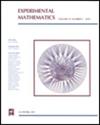On Subgroups Finite Index in Complex Hyperbolic Lattice Triangle Groups
IF 0.9
4区 数学
Q2 MATHEMATICS
引用次数: 0
Abstract
We study several explicit finite index subgroups in the known complex hyperbolic lattice triangle groups, and show some of them are neat, some of them have positive first Betti number, some of them have a homomorphisms onto a non-Abelian free group. For some lattice triangle groups, we determine the minimal index of a neat subgroup. Finally, we answer a question raised by Stover and describe an infinite tower of neat ball quotients all with a single cusp.复双曲格三角形群的子群有限指数
研究了已知复双曲格三角形群中的几个显式有限指标子群,并证明了它们中的一些是整齐的,一些具有正的第一贝蒂数,一些具有非阿贝尔自由群上的同态。对于某些格三角形群,我们确定了整齐子群的极小指标。最后,我们回答了斯托弗提出的一个问题,并描述了一个无限的整齐球商塔,所有的球商都有一个尖。
本文章由计算机程序翻译,如有差异,请以英文原文为准。
求助全文
约1分钟内获得全文
求助全文
来源期刊

Experimental Mathematics
数学-数学
CiteScore
1.70
自引率
0.00%
发文量
23
审稿时长
>12 weeks
期刊介绍:
Experimental Mathematics publishes original papers featuring formal results inspired by experimentation, conjectures suggested by experiments, and data supporting significant hypotheses.
Experiment has always been, and increasingly is, an important method of mathematical discovery. (Gauss declared that his way of arriving at mathematical truths was "through systematic experimentation.") Yet this tends to be concealed by the tradition of presenting only elegant, fully developed, and rigorous results.
Experimental Mathematics was founded in the belief that theory and experiment feed on each other, and that the mathematical community stands to benefit from a more complete exposure to the experimental process. The early sharing of insights increases the possibility that they will lead to theorems: An interesting conjecture is often formulated by a researcher who lacks the techniques to formalize a proof, while those who have the techniques at their fingertips have been looking elsewhere. Even when the person who had the initial insight goes on to find a proof, a discussion of the heuristic process can be of help, or at least of interest, to other researchers. There is value not only in the discovery itself, but also in the road that leads to it.
 求助内容:
求助内容: 应助结果提醒方式:
应助结果提醒方式:


